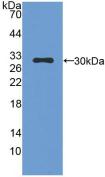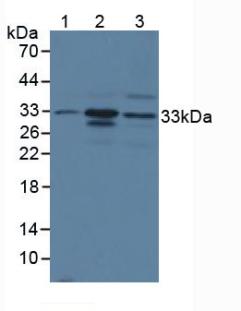Polyclonal Antibody to Chymase 1, Mast Cell (CMA1) 

CYH; CYM; Alpha-chymase; Mast cell protease I
Overview
Properties
- Product No.PAG515Mu01
- Organism SpeciesMus musculus (Mouse) Same name, Different species.
- ApplicationsWB
If the antibody is used in flow cytometry, please check FCM antibodies.
Research use only - DownloadInstruction Manual
- CategoryEnzyme & Kinase
- SourcePolyclonal antibody preparation, Host Rabbit
- Ig Type IgG, Potency n/a
- PurificationAntigen-specific affinity chromatography followed by Protein A affinity chromatography
- LabelNone
- Immunogen RPG515Mu01-Recombinant Chymase 1, Mast Cell (CMA1)
- Buffer Formulation0.01M PBS, pH7.4, containing 0.05% Proclin-300, 50% glycerol.
- TraitsLiquid, Concentration 500µg/mL
Sign into your account
Share a new citation as an author
Upload your experimental result
Review

Contact us
Please fill in the blank.
Specifity
The antibody is a rabbit polyclonal antibody raised against CMA1. It has been selected for its ability to recognize CMA1 in immunohistochemical staining and western blotting.
Usage
Western blotting: 0.01-2µg/mL;
Optimal working dilutions must be determined by end user.
Storage
Store at 4°C for frequent use. Stored at -20°C in a manual defrost freezer for two year without detectable loss of activity. Avoid repeated freeze-thaw cycles.
Stability
The thermal stability is described by the loss rate. The loss rate was determined by accelerated thermal degradation test, that is, incubate the protein at 37°C for 48h, and no obvious degradation and precipitation were observed. The loss rate is less than 5% within the expiration date under appropriate storage condition.
Organism Species More: Homo sapiens (Human)Giveaways
Increment services
-
 Antibody Labeling Customized Service
Antibody Labeling Customized Service
-
 Protein A/G Purification Column
Protein A/G Purification Column
-
 Staining Solution for Cells and Tissue
Staining Solution for Cells and Tissue
-
 Positive Control for Antibody
Positive Control for Antibody
-
 Tissue/Sections Customized Service
Tissue/Sections Customized Service
-
 Phosphorylated Antibody Customized Service
Phosphorylated Antibody Customized Service
-
 Western Blot (WB) Experiment Service
Western Blot (WB) Experiment Service
-
 Immunohistochemistry (IHC) Experiment Service
Immunohistochemistry (IHC) Experiment Service
-
 Immunocytochemistry (ICC) Experiment Service
Immunocytochemistry (ICC) Experiment Service
-
 Flow Cytometry (FCM) Experiment Service
Flow Cytometry (FCM) Experiment Service
-
 Immunoprecipitation (IP) Experiment Service
Immunoprecipitation (IP) Experiment Service
-
 Immunofluorescence (IF) Experiment Service
Immunofluorescence (IF) Experiment Service
-
 Buffer
Buffer
-
 DAB Chromogen Kit
DAB Chromogen Kit
-
 SABC Kit
SABC Kit
-
 Long-arm Biotin Labeling Kit
Long-arm Biotin Labeling Kit
-
 Real Time PCR Experimental Service
Real Time PCR Experimental Service
Citations
- Anti-Angiotensin and Hypoglycemic Treatments Suppress Liver Metastasis of Colon Cancer CellsKarger: 000330169
- Diabetes-associated angiotensin activation enhances liver metastasis of colon cancerPubMed: 22552372
- Mediators of Mast Cells in Bullous Pemphigoid and Dermatitis HerpetiformisPubmed:25400334
- Peritoneal mast cell degranulation and gastrointestinal recovery in patients undergoing colorectal surgeryPubmed:25677271
- The autocrine role of tryptase in pressure overload-induced mast cell activation, chymase release and cardiac fibrosisPubMed: 26722642
- Oral sensitization to whey proteins induces age-and sex-dependent behavioral abnormality and neuroinflammatory responses in a mouse model of food …Pubmed:29685134
- Vasoactive intestinal peptide degradation might influence Interleukin-17 expression in cardiac chagasic patientsPubmed: 30365640
- Platelets trigger perivascular mast cell degranulation to cause inflammatory responses and tissue injuryPubmed: 32206714
- Disruption in the balance between apolipoprotein A‐I and mast cell chymase in chronic hypersensitivity pneumonitisPubmed: 33016012
- Mast Cell-Derived Proteases Induce Endothelial Permeability and Vascular Damage in Severe Fever with Thrombocytopenia SyndromePubmed:35612327








